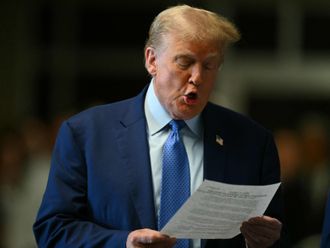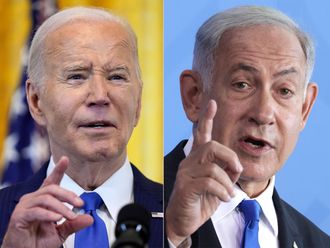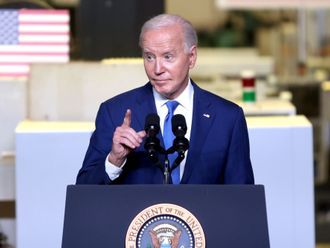West Palm Beach, Florida: As four former presidents and the current first lady travelled to the funeral of Barbara Bush in Texas, President Donald Trump took in his usual Saturday round of golf and issued a morning barrage of tweets.
Shortly after the televised funeral for Bush ended, the president indicated that he had also fielded a call from Rambo.
“Sylvester Stallone called me with the story of heavyweight boxing champion Jack Johnson. His trials and tribulations were great, his life complex and controversial,” Trump wrote on Twitter. “Others have looked at this over the years, most thought it would be done, but yes, I am considering a Full Pardon!”
But as the special counsel investigation into Russian election interference and possible ties to Trump associates continues, Trump’s mention of a presidential pardon for Johnson, who in 1908 became the first black heavyweight boxing champion, seemed to serve as a reminder that he wields the power to grant one.
The White House did not immediately respond to a question about the frequency with which Trump and Stallone communicate, and a spokeswoman for Stallone did not return a request for comment. But Trump seems to have long been fond of Stallone, an actor most famous for his portrayals of tough guys with machine guns and boxers with inferiority complexes.
In recent years, Stallone has attended functions at Mar-a-Lago and, like the president, he appears to enjoy signing his autograph in a thick Sharpied scrawl: “Greatest knockout in history!” he wrote to Trump shortly after the 2016 election.
The president returned the affection and considered bringing Stallone closer to Washington. Shortly after Trump was elected, Stallone said he had declined being considered for a White House appointment to a post with the National Endowment for the Arts.
Trump is correct that other presidents did not act on requests to pardon Johnson, whose dominance as a boxing champion in the early 1900s elicited racial animosity. In 1910, after Jackson knocked out Jim Jeffries, a white boxer, riots broke out that led to mostly black deaths at the hands of white mobs.
Three years later, a jury convicted Johnson of transporting his white girlfriend across state lines. He served a year in prison and died in 1946.
The Justice Department does not typically consider posthumous pardons because, according to department guidelines, the time “is better spent on the pardon and commutation requests of living persons.”
But for decades, lawmakers and filmmakers — and, now, a movie star — have tried to persuade presidents to pardon Johnson. Republican Senator John McCain and Rep. Peter T. King have been the most recent legislators to ask.
During nearly every term of Congress since 2004, they have introduced a resolution recommending a pardon. It passed both the House and Senate in 2009 and 2011, but just as Presidents George W. Bush and Bill Clinton before him, President Barack Obama did not grant a pardon.
“Don’t you think this issue says something about the character of America?” McCain asked The New York Times in 2015.
According to the Justice Department, Trump has issued three presidential pardons. In August, he pardoned Joe Arpaio, the former Arizona sheriff whose hard-line approach to tamping down on illegal immigration earned him a criminal contempt conviction. In March, he pardoned Kristian Mark Saucier, a Navy submariner jailed after taking unauthorised photographs in a classified area of a submarine.
This month, Trump pardoned I. Lewis Libby Jr., known as Scooter, who was convicted in 2007 of perjury and obstruction of justice for his involvement in unmasking the identity of Valerie Plame, a CIA officer.












